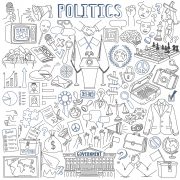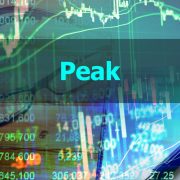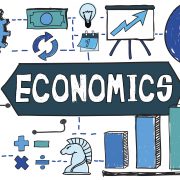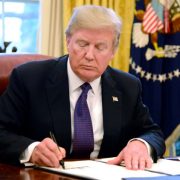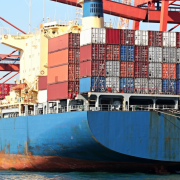In the last few years, the topic of trade and trade policy has returned to center stage in the United States, thanks to the protectionist policy and rhetoric of Donald Trump. The result has been a reopening of many debates and also an apparent shift in public opinion, toward stronger support for the free trade position. What this public argument has also done is to reveal some very basic assumptions about economics and public policy.
These foundational assumptions are particularly widespread among professional economists but are also found among social and political commentators more generally. They reflect the way that economics as a discipline has developed over the last 30 to 40 years. The assumptions are about public policy in general, not just trade, and from the individualist or classical liberal standpoint are dangerous and misleading — in fact their becoming explicit because of the current debate over trade highlights the need to clarify language in these discussions and through that thought.
In the current argument about trade, Donald Trump’s protectionism and the trade war he has started with China have led to a strong reassertion of the free trade position. Most of this has taken the form of arguments that the United States should follow a free trade policy.
Closer examination of these positions should leave one feeling very uneasy. The implication is that free trade is a policy of the government. In other words, the assumption is that free trade only exists or comes about as the result of an active government policy. Very often the explicit thesis is that free trade is something created by and dependent upon complex and elaborate intergovernmental trade agreements, such as NAFTA or the proposed Transatlantic Trade and Investment Partnership (TTIP) and Trans-Pacific Partnership (TPP).
If you actually think about it, this is a bizarre position. Free trade simply means the absence of government action, leaving people free to exchange goods and services across national borders. To have free trade, governments do not have to do anything; they simply have to stop doing things, such as imposing duties and tariffs or imposing regulatory barriers. This shows we should become aware of the misleading language used in much public discussion and commentary, particularly in the business and financial press and in academic journals.
So-called “free trade agreements,” such as the ones mentioned, are not about free trade properly understood. They are about managed and regulated trade. A trade policy centered around them is not about free trade; it is about extending the scope of regulations beyond national borders through a process of harmonization. To put it simply and bluntly, if you are an individualist liberal you do not want the government to have a “free trade policy”; you do not want it to have any kind of policy in that area. You want it to simply leave trade alone.
This principle has wider application, however. It is not simply a point about trade. A common argument about economics in general is that countries and governments should pursue a “free market economic policy.” Sometimes this simply means a transitional policy, but more often it means a continuing policy and set of government actions.
Again, the often-explicit assumption is that a free market economy is something that is produced and sustained by a suite of actions taken by governments. In this view, governments bring about a market economy by having the correct regulatory regime and by creating institutions. More significantly those making this kind of argument seem to think that the action has to be ongoing; in other words, absent continued action by government you will not have a functioning market economy.
As in the more specific question of trade, this is not the true individualist position or understanding. From that perspective, you want the government to have no economic policy at all. You want it in other words to simply leave people alone, to let them contract and exchange freely with each other. This is the true meaning of the expression laissez-faire (let do or let be). Laissez-faire is not a policy; it is the absence of an economic policy.
There is one obvious qualification. What governments do have to do is to provide an environment of law that protects rights. Arguably they should also provide things such as money and a means of registering title and ownership. The purpose of these institutions however is not to create a market economy — that will happen by itself. Rather it is to ensure that certain kinds of actions that are predatory and rights-violating are not allowed and are sanctioned, with redress for those harmed by things such as force and fraud.
The position though is that economic life should not be the concern of government and therefore of public policy in the way that law and foreign affairs are. It should be a private matter. From that perspective, a “free market policy” is a contradictory notion.
One way to understand this is to think of another area of human life. That is religion. Today, if you asked most people whether religious belief and observance should be a matter for politics and whether the government should have a religious policy and, if so, what it should be, they would look at you as though you had grown an extra head. Until relatively recently though, they would not have been surprised. In almost all societies, religion was seen as being perhaps the most quintessentially public matter and regulating and governing it was the central activity of the state along with warfare.
This was true in Imperial China, ancient Rome, and medieval and Renaissance Europe, to give just three examples. Upholding the true religion and making sure that rituals and public observance were carried out in the correct way were some of the most important things rulers did, not least in their own eyes. Sometimes there was a policy of toleration, with several faiths allowed to coexist. The key word here though is “allowed.” Religion and religious observance were still a matter of public policy, and toleration was simply one of the policy options.
Today religion is thought to be a purely private matter that does not come within the purview of politics. The practice is still subject to law; so a religion that practiced human sacrifice would not last long and beliefs and practices that lead to things such as denial of medical care to minors are overruled, but otherwise governments simply do not concern themselves with religious matters: there is no Department of Religious Affairs, and we do not have passionate op-ed debates over what the administration’s religious policy should be.
People who think there should be a “free market economic policy” are like those who, while accepting that government had a responsibility for and ultimate control over religion, advocated a policy of toleration. The point is that in both cases, the default position is that of a politically controlled and regulated aspect of life, with the option of relaxing the controls and giving the appearance (and in practical terms the reality) of greater liberty.
The underlying reality however remains that this area of life (economic life or religion) is something that government can and should be concerned with and can therefore act on to a greater or lesser degree as seems proper. So, government control remains the default position. This also means that the free exercise of religion and free economic exchange and production are both things that exist only by the grace of political power. Even more dramatically it means that power and its exercise, in the shape of a religious or economic policy, is needed to bring about a free economy or a state of religious liberty.
Why though are so many economists attracted to this way of thinking, including so many of those who see themselves as supporters of free markets? We no longer see the corresponding phenomenon of theologians who see themselves as advocates of a particular religious policy (there are a hardy few, but they are exceptions).
The explanation lies in the way the profession of economics has come to see itself since the 1930s or even earlier (some would argue from the very start, but that is much more debatable). Many economists do not see themselves simply as scholars who study and try to understand how economic life and exchange work, in the way that natural scientists study and observe the physical world. Instead they see themselves as technocratic experts whose task and role is to advise the sovereign power as to the best and most efficient way of realizing its economic goals (such as greater prosperity, full employment, economic growth).
They are not alone in this; doctors and medical scientists also increasingly see themselves in this way. An interesting contrast is between sociologists, who would like to have the expert status of economists, and epidemiologists, who in general do not. As a result, epidemiologists do still focus mainly on their academic role, of understanding human social interaction.
What too many contemporary economists do not consider is the question of whether the sovereign should have goals (and hence policies) in the economic area of human life. To assume that it does, and that their job is to use their understanding of economic life to come up with diagnoses and prescriptions for the rulers, is to concede the fundamental point.
Instead, the real point that this is none of the rulers’ business and they should simply leave people alone to get on with things and focus on other matters. The classical liberal insight and position is that governments should not have positive goals (such as national greatness or social equality or greater wealth). They should simply do the negative task of protecting rights and leave human beings to do what they want within that framework. You do not want the government to have an economic policy, even a free market one: you should want it to let people be.
Dr Steven Davies, a Senior Fellow at AIER, is the Head of Education at the IEA.

